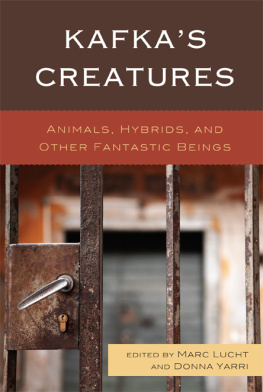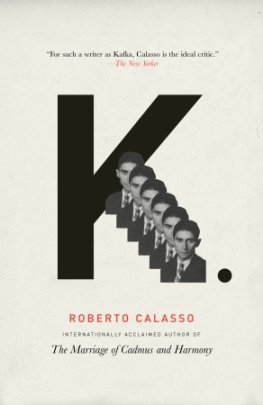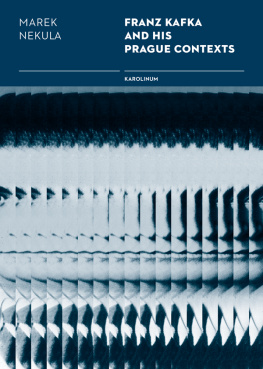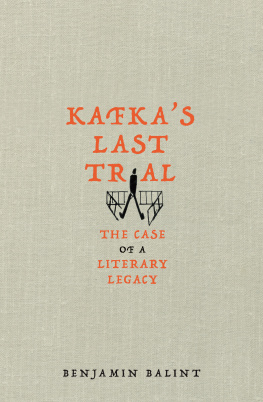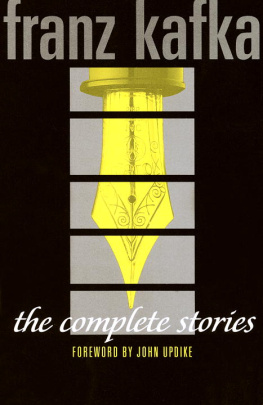
Kafkas Creatures
Kafkas Creatures
Animals, Hybrids, and Other Fantastic Beings
EDITED BY MARC LUCHT AND DONNA YARRI

LEXINGTON BOOKS
A division of
ROWMAN & LITTLEFIELD PUBLISHERS, INC.
Lanham Boulder New York Toronto Plymouth, UK
All of the quotations from these works of Franz Kafka are quoted with permission by Random House, Inc. The following works of Franz Kafka are included:
The Diaries of Franz Kafka 19101913, by Franz Kafka, edited by Max Brod, translated by Joseph Kresh, 1948 and renewed 1976 by Schocken Books. Used by permission of Schocken Books, a division of Random House, Inc.
Franz Kafka: The Complete Stories, by Franz Kafka, edited by Nahum N. Glatzer, 1946, 1947, 1948, 1949, 1954, 1958, 1971 by Schocken Books. Used by permission of Schocken Books, a division of Random House, Inc.
Parables and Paradoxes: Bilingual Edition, by Franz Kafka, 1946, 1947, 1948, 1953, 1958, and renewed 1975 by Schocken Books. Used by permission of Schocken Books, a division of Random House, Inc.
The Trial, Definitive Edition, by Franz Kafka, translated by Willa and Edwin Muir, translation 1937, 1956, renewed 1965, 1984 by Alfred A. Knopf, a division of Random House, Inc. 1925, 1935, 1946, renewed 1952, 1963, 1974 by Schocken Books, Inc. Used by permission of Schocken Books, a division of Random House, Inc.
Published by Lexington Books
A division of Rowman & Littlefield Publishers, Inc.
A wholly owned subsidiary of The Rowman & Littlefield Publishing Group, Inc.
4501 Forbes Boulevard, Suite 200, Lanham, Maryland 20706
http://www.lexingtonbooks.com
Estover Road, Plymouth PL6 7PY, United Kingdom
Copyright 2010 by Lexington Books
All rights reserved. No part of this book may be reproduced in any form or by any electronic or mechanical means, including information storage and retrieval systems, without written permission from the publisher, except by a reviewer who may quote passages in a review.
British Library Cataloguing in Publication Information Available
Library of Congress Cataloging-in-Publication Data
Kafkas creatures : animals, hybrids, and other fantastic beings / edited by Marc Lucht and Donna Yarri.
p. cm.
Includes bibliographical references and indexes.
ISBN 978-0-7391-4394-0 (alk. paper) ISBN 978-0-7391-4396-4 (electronic)
1. Kafka, Franz, 18831924Criticism and interpretation. 2. Animals in literature.
3. Animals, Mythical, in literature. 4. Human-animal relationships in literature. I. Lucht, Marc, 1969 II. Yarri, Donna.
PT2621.A26Z76125 2010
833'.912dc22 2010011424
The paper used in this publication meets the minimum requirements of American National Standard for Information SciencesPermanence of Paper for Printed Library Materials, ANSI/NISO Z39.48-1992. Printed in the United States of America
To Dorothy Yarri and the memory of Daniel Yarri, who both loved animals, especially cats
and
To Dunkel, Chamois, Tiki, and Dusty, none of whom were convinced they were just animals
Contents
1 Introduction
Marc Lucht
2 Kafkas Hybrids: Thinking Animals and Mirrored Humans
Margot Norris
3 Czechs, Jews and Dogs Not Allowed: Identity, Boundary, and Moral Stance in Kafkas A Crossbreed and Jackals and Arabs
Hadea Nell Kriesberg
4 De-allegorizing Kafkas Ape: Two Animalistic Contexts
Naama Harel
5 Agents of the Forgotten: Animals as the Vehicles of Shame in Kafka
Tahia Thaddeus Reynaga
6 The Difficult Task of Being Real: Odradek, the Kittenlamb, and the Historical Individual
Eleanor Helms
7 Consolation in Your Neighbors Fur: On Kafkas Animal Parables
Burkhard Mller
8 Crowds, Animality, and Aesthetic Language in Kafkas Josephine
Thomas H. Ford
9 Performative Emotion in Kafkas Josephine, the Singer; or, the Mouse Folk and Freuds The Creative Writer and Daydreaming
Andrea Baer
10 The Power of the Look: Franz Kafkas The Cares of a Family Man
Esther K. Bauer
11 Four Hands Good, Two Hands Bad
Tom Tyler
12 Who Identified the Animal? Hybridity and Body Politics in Kafkas The Metamorphosis and Amerika (The Man Who Disappeared)
Melissa De Bruyker
13 The Portrait of an Armor-Plated Sign: Reimagining Samsas Exoskeleton
Dean Swinford
14 Extraterrestrial Kafka: Ahead to the Graphic Novel
Henry Sussman
15 Index to Kafkas Use of Creatures in His Writings
Donna Yarri
Acknowledgments
Preparing a collection of essays such as this involves the efforts of many people. Most important are the authors of the articles. Their insightful scholarship will greatly enhance our understanding of the roles played by animals and other creatures in Kafkas writing. We are grateful for their patience and continued enthusiasm as our volume took form.
We must thank several people who were indispensable to us as we worked on this project. Esther K. Bauer was unsparingly generous with her expertise on Kafka and German literature in general. As a native speaker of German, her linguistic facility proved essential. Our book would not have been possible without her support. Marc Luchts years of challenging conversations with Gary Steiner about nonhuman animals have served to inspire and guide his thinking both about who they are and how to achieve a proper moral stance with respect to them. Professor Steiners scholarship is a model of rigorous philosophical reflection on the nature and foundation of our moral responsibility to animals, and his advice about Kafkas Creatures proved invaluable. Henry Sussmans moral support and encouragement at the outset gave us the confidence we needed to move ahead with the project, and David Silbey, a widely published historian in our department, provided us with helpful advice about the publication process along the way. Our other departmental colleagues have cheered us on as we worked on the book. Ms. Bobbie Rohrbach and our research assistant, April Batinsey, worked tirelessly to help us find relevant secondary literature and to meet our multiple requests for interlibrary loan materials, and Mrs. Christine Lindahls secretarial services were of inestimable benefit to us.
We are especially grateful to our editor at Lexington Books, Michael Sisskin, for believing in our work. We want to acknowledge as well all of the other individuals at Rowman and Littlefield who assisted at various stages of the project. We would also like to acknowledge the thorough work of Patricia Stevenson, who kept the project on schedule. We also want to thank Random House, Inc., for granting us permission to use the quotes of Franz Kafka in our work. And we would like to thank the staff of Fairchild Tropical Gardens for assisting with images from David Fairchilds Book of Monsters.
Finally, thank you to all of our family, friends, and colleagues.
A race began in the woods. The whole place was full of animals. I tried to establish order.
Franz Kafka, Dearest Father
CHAPTER 1
Introduction
Marc Lucht
There are few literary authors in whose works animals and other creatures play as prominent a role as they do in Franz Kafkas writing. The presence in his stories of burrowing forest animals, insects, mice, dogs, horses, apes, jackals, leopards, vultures, jackdaws, hares, rats, larks, and even mysterious creatures such as Odradek, the kittenlamb, and weird bouncing balls testifies to Kafkas continuing preoccupation with nonhuman creatures. These creatures speak, sing, investigate, lurk, tumble, scuttle, and tunnel their various ways to the heart of the issues explored in his literature: the nature of power, the inescapability of history and guilt, the dangers and promise and strangeness of the alienation endemic to modern life, the human propensity to cruelty and oppression, the limits and conditions of humanity and the risks of dehumanization, the nature of authenticity, family life, Jewishness, and the nature of language and art.
Next page
